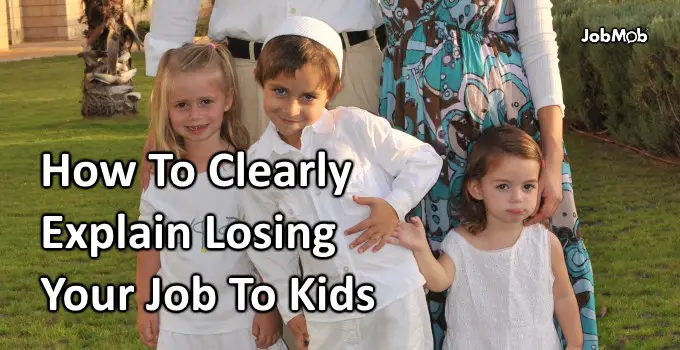Thursday 25 July 2019
Thursday 18 July 2019
👶 How To Clearly Explain Losing Your Job To Kids
The best way to tell your family you lost your job.

My own layoff story
I was last laid off in early 2006.
At that time, I had 2 kids aged 3 and 2. To me they seemed too young for the layoff to have much meaning in their eyes, but I was wrong.
Before the layoff, my kids barely saw me each weekday. I would leave for work early and come home as they were getting ready for bed, or later.
After the layoff, they saw me all the time. My new job – the job search – gave me the flexibility to take the kids to school and pick them up afterward while still networking, getting interviewed, etc.
My wife and I didn't make a big deal of the change, and to be honest, we didn't really spend much time thinking about whether that was the best way to react. We just told the kids that I would working from home from now on and they took it in stride. Or “Yay!” as they put it.
Kids make everything better. You try to explain what "layoff" means and you get back "I won't have to miss dad ever again!"
— Kristen M. (@WeBeReading) June 29, 2011
Looking back recently, I was curious to hear what child experts would say.
Free bonus: The Midlife Job Search Report is a handy guide I compiled for older job seekers. Download it now.
Be honest and patient
Russell Friedman, former Executive Director of The Grief Recovery Institute Educational Foundation, blogger for Psychology Today and co-author of 3 books including When Children Grieve, suggested:
- Adults—you go first. Telling the truth about your own feelings about your work situation will make it safe for your child to open up about his or her feelings.
- Remember that each of your children is unique and each has a unique relationship to the loss event or situation.
- Be patient. Don’t force them to talk about it.
- Never say “Don’t feel sad” or Don’t feel scared.” Sadness or fear are the two most normal feelings in reaction to loss or change of any kind. They are also essential feelings to being human.
- When they do talk, listen with your heart not your head. Allow all emotions to be expressed without judgment, criticism, or analysis.
React carefully
Dr. Elizabeth R. Lombardo, Ph.D., M.S., P.T. and author of “A Happy You: Your Ultimate Prescription to Happiness,” says:
We often assume that children will be so worried if Daddy is not working, but that is not the case. What causes them stress is parents’ reaction to Daddy’s unemployment.
Unlike parents, children are not calculating the cost of the mortgage and monthly bills, stressed that they cannot be paid. They are not tormented by fears that they may never get another job, or at least not before they lose their home. Children are much more in the here and now. So what is important to them is (1) Daddy is now home to play with me and (2) how Mommy and Daddy are feeling.
Children can be incredibly intuitive. They may not understand why parents are stressed but they can sense something is wrong if you are.
So, how do you tell your young child that their father is unemployed? Try something like “Daddy is not working right now. He will be getting another job soon. Now he is going to focus spending some time playing with you.” You can even highlight some things they might do together (read book, go to the park, play ball…)
More importantly than what you say, though, is your reaction. Try to address your stress level- what you outwardly say and do as well as how you feel inside. Again, children can sense your stress, which then can cause anxiety for them.
@MHChat It’s definitely more difficult to find work after 50 -in my experience. After a layoff 2 yrs ago, I’ve found employers less interested in experience and more interested in paying less to older workers. Even more challenging if you’re caring for kids or parents.
— e
(@erinnelansing) July 17, 2019
Have the right attitude going forward
Vicki Hoefle, 20 Year Parent Educator, Mother of 5 teens and creator of Parenting On Track , recommends:
, recommends:
- Children follow their parents lead so attitude is everything. You convey your confidence or lack their off with not only your words, but your voice, tone, body language and eye contact.
- Children can feel a parents' confidence and take their cues from this.
- As you explain the “change” in employment, the details will not be as important as your attitude about this change.
- Most children can not comprehend the idea of work, let alone the idea of unemployment. Narrow this down and talk about it from the child's perspective. Think about how this might impact the child's life. Maybe you will be home in the morning to take them to school. Maybe you will be home at night to have dinner with the family. It isn't as important to talk about the fact that you may have less money to spend on eating out, kids don't pay attention to that. Talk about the tangible changes your children will notice.
- Children do not need updates. They only require that when a significant change, like another job, or moving because you have to sell the house, is explained to the extend that they can assimilate the information. Again, your attitude of “things will be fine, I know what I am doing” is the only thing that matters to young children.
- So curb the desire to tell the kids everything. Use discernment and community a sense of confidence and security to your children during this transitional time.
Involve children at their level
Heather Davis Richards, former VP of Public Affairs for financial education company Essential Knowledge, tells:
Little kids are very resilient to change. They can actually be a huge asset to the family, with their eagerness to be involved. We have seen children all over the world work to raise money for cancer victims, animal rights, and other topics that seem overwhelming. So when it comes to a layoff in the family, it’s best to get them involved at a level they can understand.
First, discuss with your spouse privately, how you both intend to deal with the situation. What budget cuts will need to be made? What changes will that mean? We planned in advance, what the job loss would mean to the family, and how we would cope with the situation. In our family, when my husband was laid off, we decided to cancel after school childcare to save money.
The two biggest questions that children have with this type of situation are, “how will this impact me?” and “should I be scared about this?”
When we discussed it with our seven-year-old, we made sure to stress that everything was going to be fine. There would be changes for awhile, and we made sure to state upfront how that might impact her. She was actually overjoyed at some of the decisions. She was thrilled to be able to ride the bus after school, for instance.
We also asked for her help. We asked for her to help us to look for ways to save money while looking for a new position. She offered to forfeit her allowance, and had many creative ways that we could have inexpensive fun on the weekends. When her birthday rolled around, she came up with the idea for a party at home to cut costs. Don’t be afraid to enlist your children’s help, it empowers them that they are a part of the solution.
Takeaway lessons
- Decide with your spouse how the family should cope with the post-layoff situation
- Tell your family about the layoff without going into details
- Assure your children that everything will be ok (easier said than believed, I know)
- Involve your children in any lifestyle changes, such as cost-cutting
Question of the article
What about you: how have you dealt with unemployment in your family? Tell us in the comments.
Free BonusThe Midlife Job Search Report is a handy guide I compiled to help older job seekers.
This free download contains:- 5 Common Mistakes Older Job Seekers Make
- How To Defeat Any Form of Job Search Discrimination
- How Older Job Seekers Beat These Common Stereotypes
- 9 Scary Reasons Overqualified Job Seekers are Rejected
- 40 Tips for Older Job Seekers That Actually Get Results

JobMob Insiders can get this free bonus and other exclusive content in the JobMob Insider Bonuses area. Join now, it's free!
READ NEXT: Recently Laid Off? Here’s A Quick Job Search Refresher Guide
Subscribe to JobMob via RSS or email and follow me on Twitter for more ideas on how to deal with unemployment in the family.
via JobMob More Information Here..


